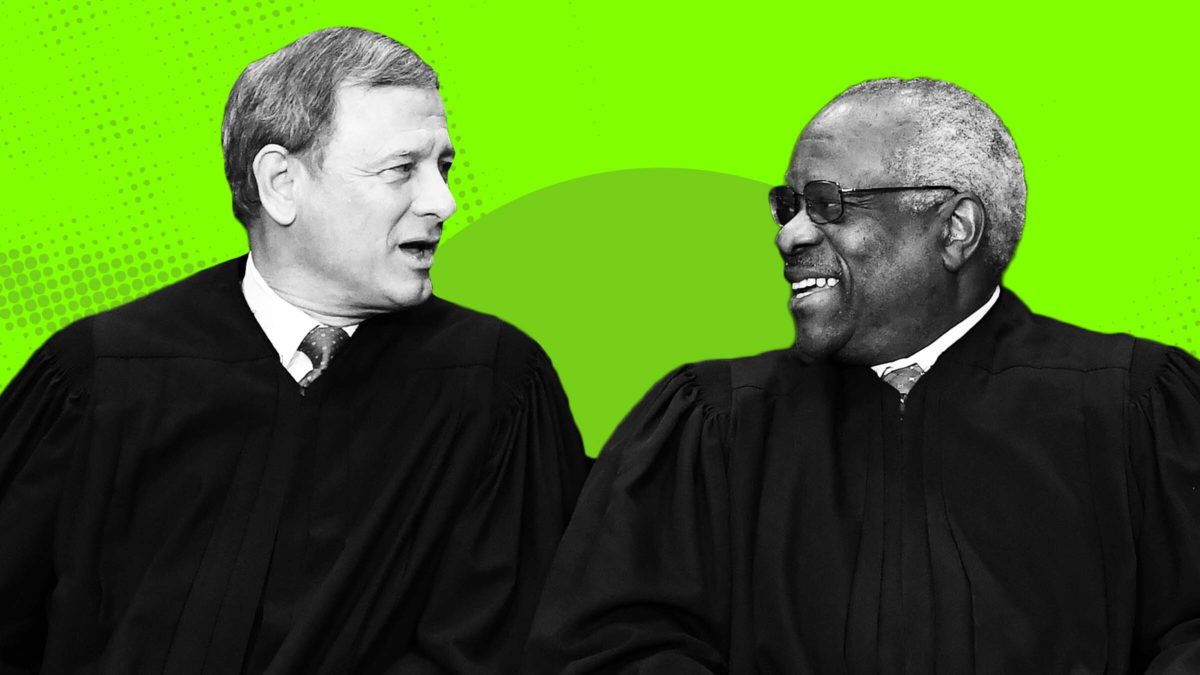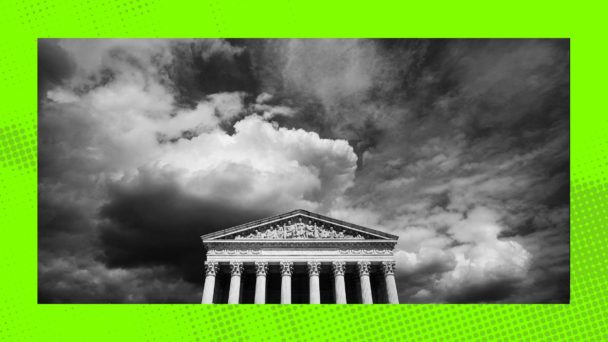As the Supreme Court kicks off its latest term by pondering the functional end of the Voting Rights Act, lower court Trump judges, too, keep doing their jobs in ways that deliver exactly the results that Trump-types want. The latest accomplishment of Leonard Leo’s federal judiciary: blocking anything that even looks like a vaccine mandate every time the Biden administration crafts a different one.
This time around, in Louisiana v. Becerra, 24 states sued the Biden administration over the Head Start Mandate, a rule requiring staff, volunteers, and vendors at Head Start facilities to be vaccinated against COVID-19, and requiring adults and children to wear masks. (Head Start is a federal program that provides free health and educational services for children from low-income families.) After someone who didn’t want to wear a mask or get vaccinated filed the inevitable lawsuit, two dozen states with Republican attorneys general quickly decided to come along for the ride. The case landed in the courtroom of Judge Terry Doughty, who was appointed to the Western District of Louisiana by President Donald Trump in 2018,
(It must be odd being an assistant AG in a red state these days, since the entire job is monitoring PACER hoping a malcontent anti-vaxxer will have filed a lawsuit you can lamprey-eel on to, or backchanneling your own elaborate multi-state attack on a randomly-selected Biden policy and praying whoever you draft as the face of the lawsuit isn’t too weird.)
There’s a threshold question about whether the states even have the right to be in the courtroom here, since the consequences for failing to follow the mandate would affect a Head Start facility, not a state. But, Doughty noted, federal courts are required to show a “special solicitude” to a state’s claim of federal incursions on the state’s “quasi-sovereign” interests, such as its ability to make laws or control its territory. And here, he says, states have a “quasi-sovereign interest” in “protecting their citizens from being required to submit to vaccinations and/or mask mandates.” The Federalist Society version of federalism is guarding zealously against the creeping tyranny of preschool teachers not getting kids sick.

A grave assault on the very idea of individual liberty (Photo by David Crane/MediaNews Group/Los Angeles Daily News via Getty Images)
Doughty wasn’t finished bending over backwards to accommodate the states, though. The states also have standing, he wrote, because if a Head Start facility is closed for failure to adhere to the mandate, or someone gets fired because they comply, a state would lose “jobs, businesses, tax revenue, unemployment benefits.” In other words, a state can now sue because of the possibility that someone somewhere in the state someday might lose their job for failing to follow basic rules.
Doughty isn’t the first conservative judge to come up with this theory. The last several years have yielded a whole body of terrible case law in this vein. Doughty’s opinion leans on Florida v. Becerra, a 2021 decision from George H. W. Bush appointee Steven Merryday, a federal district court judge in Florida. In that version of Becerra, Merryday ruled that the Biden administration wasn’t allowed to place COVID-19-related conditions on cruise ships, because it interfered with Florida’s economy. This argument, of course, can apply to literally any exercise of authority the federal government might undertake. States will always have standing to sue if you elongate the potential harm all the way out to “someone, somewhere, might get fired.”
This parade-of-horribles framing makes the task of getting into court a layup for conservative states. The Biden administration, on the other hand, will always be fighting an uphill battle, because it’s not possible to craft a rule that somehow has no consequences for those who fail to follow it.
Doughty’s opinion only gets dumber from here. In this type of lawsuit, where the states seek to permanently block a federal agency mandate, he is supposed to “balance the equities”—to decide whether blocking the rule would harm the Department of Health and Human Services, and whether the public interest favors the injunction. Grudgingly, Doughty allows that vaccines “arguably serve the public interest.” But then, he pivots to talking about the public interests about which he actually cares: “The liberty interests of individuals mandated to take the COVID-19 vaccine outweigh any interest generated by the mandatory administration of vaccines,” he writes.
That meager conclusory sentence is the sum total of Doughty’s acknowledgement that the public might just have an interest in public health. Six tiny words about how maybe it would be great if children from low-income families didn’t have to risk getting COVID-19 from a part-time Head Start teacher whose brain has been turned to coal slag from nightly viewings of Tucker Carlson.

“Give me liberty, or give me a communicable disease that I could ward off with a simple cloth mask” -Patrick Henry (Photo by Paul Bersebach/MediaNews Group/Orange County Register via Getty Images)
This case also allowed Doughty to fully deploy the “major questions” doctrine, which the Supreme Court gifted to conservative states a few months ago in West Virginia v. EPA. Under this theory, agencies can only take meaningful action on big, weighty policy questions if there exists “clear congressional authorization” for them to do so. In practice, what this means is that six unelected Supreme Court justices get to glance at the evidence before them and solemnly declare that Congress wasn’t clear enough. For a conservative legal movement obsessed with breaking government, the major questions doctrine is a failsafe way of getting there: The decision, as Kagan noted in her dissent, takes power away from Congress and transfers it to the Court, essentially barring the legislature from allowing agencies to respond to new, big problems without judicial approval.
Pro-pandemic jurisprudence has become something of a beat for Doughty. In 2021, he threw out the Biden administration’s vaccine mandate for health care workers, concluding that it didn’t have the authority to impose such a mandate and that Congress, even if it tried, might not have the constitutional authority to do so. Doughty’s opinion also criticized the agency for failing to consider the “natural immunity” of people who already had COVID-19, sprinkling in a little vaccine skepticism for good measure. “If boosters are needed six months after being ‘fully vaccinated,’ then how good are the COVID-19 vaccines, and why is it necessary to mandate them?” he wrote.
Since the justices had not yet decided West Virginia, Doughty couldn’t say much about the major questions doctrine at the time. Now, though, he has the full weight of a 6-3 Supreme Court decision behind this paralyzing nonsense, enabling him to dump the “natural immunity” rhetoric and pivot to the new hotness of 2022: agencies can’t do anything if it makes conservative states sad. Instead of Just Asking Questions about the efficacy of vaccines, Doughty can just throw up his hands and say that because Congress didn’t specifically anticipate a once-in-a-century plague, there is nothing modern government can do about it.
Already, the most consequential decisions from the Court’s most recent term are having a ripple effect in lower courts. The opinion in New York State Rifle and Pistol Association v. Bruen, which threw out a New York law limiting the issuance of concealed carry licenses, has been a boon for every lower court eager to argue that the Framers wanted a machine gun in every home. Two weeks after Bruen, a federal judge in Colorado struck down a town assault weapons ban on the grounds that he was unaware of historical precedent that would allow bans on guns that are “commonly used by law-abiding citizens for lawful purposes.” In September, Trump appointee David Counts tossed a Texas law that had prohibited people facing felony convictions from purchasing guns, saying the government hadn’t proved that such a step “aligns with historical tradition.”
None of these cases do what judges claim to be doing: carefully, thoughtfully balancing existing precedent with future consequences. These cases simply take the id of conservative dogma—the idea that the government cannot tell them what to do—and enshrine it into law. Although the Biden administration can of course appeal this decision, they’ll do so to the Fifth Circuit Court of Appeals, a court stuffed with right-wing goons who make Doughty look like Earl Warren, and then to the Supreme Court, which on its best day is only slightly less offensive. Thanks to a federal court system captured by life-tenured reactionaries, individual liberty is going to spend the next several generations kicking the teeth out of the common good.




